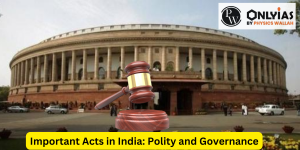Important Acts in India List: Explore key acts and reforms from the British era to present day that shaped India’s governance, economy, and society. Essential for understanding India's legal evolution.

Important Acts in India: India has a rich legislative history, marked by the enactment of significant acts and laws that have shaped the country’s governance, economy, social fabric, and environmental framework. These acts are crucial for aspirants preparing for the Union Public Service Commission (UPSC) examinations, as they form an integral part of the general awareness and polity sections.
From historical acts that laid the foundation of modern governance to contemporary legislations that address pressing issues, understanding these acts is essential for a comprehensive understanding of India’s legal system and its socio-economic and political landscape.
This article provides an overview of important acts in India across various domains, including modern history, polity and governance, environment and ecology, economy, social issues, and more. It aims to equip UPSC aspirants with the knowledge and insights of Important Acts in India necessary to navigate the vast and diverse legislative landscape of India.
By delving into these Important Acts in India, aspirants can gain a deeper understanding of the historical context, objectives, provisions, and implications of each legislation. This knowledge of Important Acts in India not only helps in answering questions related to legislation but also fosters a holistic understanding of the social, economic, and political aspects of India.
Remember, a thorough understanding of these Important Acts in India is not only beneficial for the UPSC examinations but also for gaining a deeper understanding of India’s democratic system, policy-making processes, and the legal mechanisms that govern the country’s socio-economic progress. So the Important Acts in India is a very crucial topic in understanding the Polity of India.

Modern Indian history is marked by several key acts and reforms that played a significant role in shaping the socio-political landscape of the country. These Important Acts in India, spanning from the 18th to the 20th century, were instrumental in initiating crucial changes in governance, administration, social practices, and constitutional frameworks.
These legislative measures and Important Acts in India were introduced by the British colonial government, reflecting the evolving dynamics of India’s struggle for independence and the subsequent efforts to transform the nation.
From the Regulating Act of 1773 to the Indian Independence Act of 1947, each act and reform played a crucial role in influencing India’s political, economic, and social development. These Important Acts in India provided a platform for important discussions and debates, both within the colonial administration and among Indian leaders and intellectuals.
Understanding the historical background, provisions, and consequences of these Important Acts in India and reforms is crucial for aspirants preparing for competitive examinations, as it provides a deeper understanding of the socio-political dynamics of the time and the foundations of India’s democratic framework.
Let us have a look at the Important Acts in India:
The Regulating Act was the first major legislative intervention by the British Parliament in the governance of British India. It established a system of control and regulation over the British East India Company’s activities in India. The act introduced the office of the Governor-General of Bengal, who was appointed by the Crown and had powers to supervise and control the company’s affairs.
The Pitt’s India Act aimed to rectify the shortcomings of the Regulating Act. It established a dual administration system in India, with the Board of Control in London supervising the company’s affairs and the Governor-General in India exercising executive powers. The act sought to improve governance and increase the accountability of the company’s officials.
The Charter Act of 1793 renewed the charter of the British East India Company for another 20 years. It introduced several reforms, including the establishment of a college for the training of civil servants (later known as Haileybury College) and the imposition of certain restrictions on the company’s trade activities.
The Charter Act of 1813 further extended the company’s charter and made significant changes to its trade monopoly. It allowed Indian goods to be imported into Britain, except for tea, and opened up trade with China. The act also introduced Christian missionaries to India and provided for the promotion of education and the diffusion of knowledge.
The Charter Act of 1833 marked a major shift in British policy towards India. It abolished the company’s trade monopoly and established a system of open competition for civil service appointments. The act also provided for the appointment of a Governor-General for all of British India and expanded the legislative powers of the Governor-General’s Council.
The Charter Act of 1853 further reformed the legislative system in India. It increased the number of members in the Governor-General’s Council and allowed for the appointment of Indians as members. The act also recognized the separate legislative powers of the Presidency Governments and introduced the concept of local legislation.
The Government of India Act, 1858, also known as the Act for the Better Government of India, was passed following the Indian Rebellion of 1857. It transferred the administration of India from the East India Company to the British Crown. Under this act, the British government assumed direct control over the governance of India through the Secretary of State for India and the Viceroy.
The Thuggee and Dacoity Suppression Acts were a series of laws enacted between 1836 and 1904 to combat criminal activities such as thuggee (organized highway robbery) and dacoity (gang robbery). These acts provided for the identification, prosecution, and punishment of individuals involved in such crimes, and aimed to suppress these criminal activities in British India.
The Indian Councils Act, 1861, expanded the legislative councils established under the Charter Acts. It introduced a system of limited representation and allowed for the inclusion of Indians as non-official members in the legislative councils. The act provided Indians with a platform to voice their concerns and participate in the legislative process.
The Criminal Tribes Act, 1871, classified certain communities as “criminal tribes” and imposed strict surveillance and restrictions on their movements and activities. The act stigmatized entire communities and perpetuated social discrimination, contributing to the marginalization and deprivation of these communities.
The Indian Councils Act, 1892, further expanded the legislative councils and increased the number of non-official members. It also introduced the concept of communal representation, allowing for separate electorates based on religion, which had significant implications for the communal divide in Indian politics.
The Indian Councils Act, 1909, introduced significant reforms to the legislative councils. It expanded the size of the councils, increased the number of elected members, and further extended communal representation. The act aimed to encourage moderate political participation and provide limited self-governance to Indians.
The Defence of India Act, 1915, was enacted during World War I to provide the colonial government with extensive powers to suppress nationalist activities and curb dissent. It allowed for the arrest and detention of individuals without trial and severely restricted civil liberties, leading to widespread criticism and protests.
The Government of India Act, 1919, also known as the Montagu-Chelmsford Reforms, introduced significant changes to the governance of British India. It expanded the powers and responsibilities of Indian legislative councils, introduced the concept of dyarchy (dual government) at the provincial level, and allowed for greater participation of Indians in the administration.
The Rowlatt Act, also known as the Anarchical and Revolutionary Crimes Act of 1919, was passed by the British colonial government to suppress political dissent in India. It authorized the arrest and detention of individuals without trial and curtailed civil liberties. The act sparked widespread protests and ultimately led to the Jallianwala Bagh massacre in 1919.
The Government of India Act, 1935, provided for a significant devolution of powers to Indian provinces. It introduced a federal structure with separate provincial and central governments, expanded the role of elected representatives, and granted limited autonomy to provinces. The act laid the groundwork for the eventual establishment of an independent India.
The Ilbert Bill, introduced in 1883, aimed to allow Indian judges to preside over cases involving European offenders in India. It generated significant controversy and opposition from the European community, leading to its dilution and eventual abandonment. The bill highlighted the racial and social tensions prevalent during the colonial era.
The Indian Independence Act, 1947, was enacted by the British Parliament, leading to the partition of India and the creation of two independent nations, India and Pakistan. The act granted independence to both countries and provided for the transfer of power from British rule to the newly formed governments.

Following are the Important Acts and Reforms in India related to Polity and Governance:
The Representation of People Act, 1951, is a significant legislation that governs the conduct of elections in India. It provides for the preparation and revision of electoral rolls, qualifications and disqualifications of candidates, the process of filing nominations, and the conduct of elections. The act ensures fair and transparent elections in the country.
The Right to Education Act, 2009, is a landmark legislation that guarantees free and compulsory education to children between the ages of 6 and 14 in India. The act mandates the provision of quality education, the prohibition of discrimination, and the promotion of inclusive education. It aims to ensure that every child has access to education as a fundamental right.
The Right to Information Act, 2005, empowers citizens to seek information from public authorities, promoting transparency and accountability in governance. It provides a mechanism for citizens to access government records and information. The act has been instrumental in promoting openness and enabling citizens to participate in the decision-making process.
The Official Secrets Act, 1923, is a legislation that protects the confidentiality of certain official information and imposes penalties for unauthorized disclosure. It aims to safeguard national security and maintain the confidentiality of sensitive government documents. The act balances the need for transparency with the protection of vital national interests.
The Epidemic Diseases Act, 1897, empowers the government to take special measures to prevent the spread of dangerous epidemic diseases. It grants authorities the power to enforce quarantine, implement preventive measures, and regulate public gatherings during epidemics. The act plays a crucial role in managing public health emergencies and preventing the spread of diseases.
The 44th Amendment Act, 1978, brought significant changes to the Constitution of India. It restored certain fundamental rights that were curtailed during the Emergency period and reinforced the supremacy of the Constitution. The amendment strengthened democracy and ensured the protection of individual rights and freedoms.
The 42nd Amendment Act, 1976, was a comprehensive amendment to the Constitution of India. It introduced several changes, including the insertion of fundamental duties, the modification of emergency provisions, and the expansion of parliamentary powers. The amendment aimed to strengthen the position of the central government and promote the principles of socialism, secularism, and national unity.
The Disaster Management Act, 2005, provides a legal framework for disaster management in India. It establishes institutional mechanisms, defines roles and responsibilities, and outlines procedures for disaster response, mitigation, and recovery. The act facilitates a coordinated and effective approach to deal with natural or man-made disasters.
The Road Safety and Motor Vehicles Amendment Bill, 2019, introduced several reforms to enhance road safety in India. It proposed stricter penalties for traffic violations, the promotion of electronic enforcement, the facilitation of digital services, and the improvement of road infrastructure. The bill aims to reduce road accidents and make Indian roads safer.
The Drug Price Control Order, 2013, empowers the government to regulate the prices of essential medicines in India. It aims to make essential drugs affordable and accessible to the general public. The order ensures that pharmaceutical companies do not charge exorbitant prices for critical medications and promotes equitable access to healthcare.
The National Medical Commission Bill, 2019, seeks to reform medical education and practice in India. It proposes the establishment of the National Medical Commission to replace the Medical Council of India. The bill aims to enhance the quality of medical education, promote transparency, and streamline the medical regulatory system.
The Mines and Minerals Development and Regulation Amendment Bill, 2015, introduced reforms in the mining sector. It aimed to bring transparency, accountability, and sustainable development in the mining industry. The bill facilitated the auctioning of mineral resources, ensured the welfare of affected communities, and promoted environmental conservation.
The Mahatma Gandhi National Rural Employment Guarantee Act (MGNREGA) is a social security measure that guarantees a legal right to employment for rural households in India. It provides employment opportunities for a specified number of days per year to eligible individuals. MGNREGA aims to enhance livelihood security, reduce rural poverty, and promote sustainable development.
The Personal Data Protection Bill, 2019, seeks to regulate the collection, storage, processing, and use of personal data in India. It establishes principles for data protection, individual rights, and data processing obligations. The bill aims to safeguard individuals’ privacy and ensure the secure handling of personal data.
The Information Technology Act, 2000, provides a legal framework for electronic governance and cyber-related issues in India. It recognizes electronic records and digital signatures, regulates cybercrimes and cybersecurity, and establishes mechanisms for the protection of sensitive personal and financial information. The act promotes secure electronic transactions, facilitates e-governance initiatives, and addresses legal challenges arising from the use of information technology.
The Narcotic Drugs and Psychotropic Substances Act, 1985, is an important legislation that regulates the production, sale, and consumption of narcotic drugs and psychotropic substances in India. It aims to control drug abuse and trafficking, protect public health, and ensure the effective implementation of international drug control conventions.
The 73rd Constitutional Amendment Act, 1992, introduced a constitutional framework for decentralized governance through Panchayati Raj institutions in rural areas. It granted constitutional status to the Panchayats and mandated their participation in local self-governance. The amendment aimed to empower local communities, enhance grassroots democracy, and promote rural development.
The Government of NCT of Delhi (Amendment) Act, 2021, amended the Government of National Capital Territory of Delhi Act, 1991. It clarified the powers and responsibilities of the Lieutenant Governor and the elected government of Delhi. The act aimed to provide clarity and address issues related to the functioning of the government in the National Capital Territory of Delhi.
The Places of Worship (Special Provisions) Act, 1991, is a legislation that seeks to maintain the religious character of certain places of worship as it existed on August 15, 1947. The act prohibits the conversion of any place of worship and ensures the preservation of religious harmony and sentiments.
The 102nd Amendment Act, 2018, introduced changes to the Constitution of India to grant constitutional status to the National Commission for Backward Classes (NCBC). It aimed to strengthen the institutional framework for the welfare and upliftment of socially and educationally backward classes.
The Prevention of Corruption Act, 1988, is an important anti-corruption legislation in India. It provides for the prevention, investigation, and prosecution of corrupt practices by public servants. The act aims to combat corruption, promote integrity in public administration, and protect the interests of the general public.
The Tribunals Reforms Act, 2021, aims to streamline the functioning of tribunals in India. It provides for the establishment of a dedicated appellate body, the National Tribunals Commission, to oversee the functioning of various tribunals. The act seeks to enhance the efficiency, accountability, and accessibility of the tribunal system.

Following are the important Acts in India related to Environment & Ecology:
The Wildlife Protection Act, 1972, is a comprehensive legislation that provides for the protection, conservation, and management of wildlife in India. It aims to safeguard endangered species, regulate hunting and poaching, establish protected areas, and promote wildlife research and education. The act plays a crucial role in preserving India’s rich biodiversity and ensuring the sustainable management of wildlife resources.
The Compensatory Afforestation Fund Act (CAMPA), 2016, was enacted to regulate the utilization of funds collected for afforestation and conservation activities. It provides for the establishment of the Compensatory Afforestation Fund Management and Planning Authority (CAMPA) to facilitate the efficient utilization of funds for afforestation, regeneration of forests, and wildlife conservation.
The National Water Framework Bill, 2016, seeks to establish a legal framework for the sustainable management and regulation of water resources in India. It emphasizes the principles of integrated water resources management, equitable distribution, and conservation of water. The bill aims to address the challenges of water scarcity, pollution, and conflicts over water resources.
The Forest Rights Act, 2006, recognizes the rights of forest-dwelling communities, including scheduled tribes and other traditional forest dwellers, over the forestland they have been residing in for generations. It provides for the granting of individual and community forest rights, the conservation of biodiversity, and the sustainable management of forest resources. The act aims to empower forest-dependent communities and promote their participation in forest governance.
The Biological Diversity Act, 2002, is a legislation that aims to conserve biological diversity, promote sustainable use of its components, and ensure equitable sharing of benefits arising from the utilization of biological resources. It establishes the National Biodiversity Authority and State Biodiversity Boards to regulate access to biological resources, protect traditional knowledge, and promote conservation and sustainable development.
The Environment (Protection) Act, 1986, is a key legislation that provides for the protection and improvement of the environment in India. It empowers the central government to take measures to prevent and control environmental pollution, regulate hazardous substances, and protect natural resources. The act enables the enforcement of environmental standards, the management of hazardous wastes, and the conservation of ecosystems.
The Air (Prevention and Control of Pollution) Act, 1981, is a legislation that aims to prevent and control air pollution in India. It provides for the regulation of emissions from industries, the establishment of pollution control boards, and the promotion of measures to improve air quality. The act enables the enforcement of air quality standards, the prevention of air pollution, and the protection of public health.
The Forest Conservation Act, 1980, seeks to regulate the diversion of forestland for non-forest purposes. It mandates prior approval from the central government for the diversion of forestland for activities such as mining, industry, infrastructure development, and non-forest plantations. The act aims to ensure the sustainable use and conservation of forest resources while balancing developmental needs.
The Indian Forest Act, 1927, is an important legislation that governs the administration and management of forests in India. It provides for the protection of forests, the regulation of forest produce, and the prevention of illegal activities such as encroachment and smuggling. The act empowers forest authorities to manage forests, conserve biodiversity, and promote sustainable forest management practices.
The Energy Conservation Act, 2001, aims to promote energy efficiency and conservation in India. It establishes the Bureau of Energy Efficiency and prescribes energy efficiency standards and labeling requirements for appliances and equipment. The act promotes energy audits, energy-efficient practices, and the adoption of renewable energy sources to reduce energy consumption and mitigate climate change.

Following are the important Acts in India related to Economy:
The Taxation Laws (Amendment) Act, 2021, aims to amend various tax laws in India to provide relief to taxpayers and promote ease of doing business. It introduces changes in provisions related to income tax, corporate tax, and indirect taxes to simplify compliance procedures and encourage investment and economic growth.
The Inland Vessels Bill, 2021, seeks to regulate and promote the development of inland waterways transportation in India. It aims to provide a comprehensive legal framework for the construction, survey, registration, and operation of inland vessels. The bill aims to facilitate the growth of inland waterways as a cost-effective and environmentally friendly mode of transportation.
The Major Port Authorities Act, 2021, replaces the earlier Major Port Trusts Act, 1963, and aims to provide greater autonomy to major ports in India. It seeks to improve governance, efficiency, and competitiveness of major ports by establishing port authorities with greater decision-making powers and flexibility in operations and tariff setting.
The Code on Social Security, 2020, consolidates and amends the laws relating to social security benefits and welfare measures for workers in India. It aims to provide comprehensive social security coverage to all workers, including gig workers and platform workers. The code brings together various existing social security schemes and provides a framework for their implementation.
The Consumer Protection Act, 2019, is a comprehensive legislation that aims to protect the rights and interests of consumers in India. It establishes consumer forums, provides for the redressal of consumer grievances, and lays down guidelines for consumer rights, product liability, and unfair trade practices. The act strengthens consumer protection mechanisms and promotes fair and transparent business practices.
The Indian Companies Act provides the legal framework for the incorporation, regulation, and governance of companies in India. It defines the rights, responsibilities, and obligations of companies, shareholders, directors, and other stakeholders. The act aims to ensure corporate transparency, accountability, and responsible business practices.
The Competition Act, 2002, aims to promote competition, prevent anti-competitive practices, and protect the interests of consumers in India. It prohibits anti-competitive agreements, abuse of dominant market position, and regulates mergers and acquisitions. The act establishes the Competition Commission of India as the regulatory authority to enforce competition law provisions.
The Fiscal Responsibility & Budget Management (FRBM) Act, introduced in 2003, aims to promote fiscal discipline, prudent fiscal management, and long-term sustainability of public finances. It sets targets for fiscal deficit, revenue deficit, and debt levels and provides guidelines for fiscal policy formulation and implementation.
The Securitization and Reconstruction of Financial Assets and Enforcement of Security Interest (SARFAESI) Act, 2002, empowers banks and financial institutions to enforce the security interest created in favor of them by borrowers. It provides a legal framework for the speedy recovery of non-performing assets and enables banks to take possession and sell assets to recover dues.
The Insolvency and Bankruptcy Code, 2016, is a landmark legislation that provides for a time-bound and efficient resolution process for insolvency and bankruptcy cases in India. It aims to promote ease of doing business, protect the interests of creditors and investors, and facilitate the revival of financially distressed companies.
FERA (Foreign Exchange Regulation Act) and FEMA (Foreign Exchange Management Act) are legislations that regulate foreign exchange transactions in India. FERA was enacted in 1973 and later replaced by FEMA in 1999. These acts govern matters related to foreign exchange transactions, external trade, and foreign investments in India.
The Foreign Contribution Regulation Act, 2010, regulates the acceptance and utilization of foreign contributions by individuals, associations, and organizations in India. It aims to ensure that foreign contributions are used for legitimate purposes and do not disrupt the social, economic, or political fabric of the country.
The Industrial Disputes Act, 1947, provides a legal framework for the prevention and settlement of industrial disputes between employers and employees in India. It aims to promote harmonious industrial relations, ensure social justice, and protect the rights and interests of workers and employers.
The recent labor codes introduced by the government aim to streamline and consolidate labor laws in India. These codes include the Industrial Relations Code, the Occupational Safety, Health and Working Conditions Code, and the Social Security Code. They seek to simplify labor laws, enhance worker welfare, and promote ease of doing business.
The Prevention of Money Laundering Act, 2002, is a legislation that aims to prevent money laundering and the financing of terrorist activities in India. It provides for the investigation, prosecution, and confiscation of proceeds of crime. The act establishes the Financial Intelligence Unit as the central agency responsible for collecting, analyzing, and disseminating financial intelligence.
The Occupational Safety, Health and Working Conditions Code, 2020, consolidates and amends the laws relating to the safety, health, and working conditions of workers in India. It aims to ensure a safe and healthy working environment, provide social security benefits, and promote the welfare of workers in various industries.
The Code on Wages Bill, 2019, seeks to regulate and simplify the payment of wages to workers in India. It aims to consolidate and amend the laws relating to wages and bonus, provide for a standardized minimum wage, and ensure timely payment of wages to all workers. The bill provides for the establishment of wage boards and the setting of minimum wages for different categories of workers.
The Fugitive Economic Offenders Act, 2018, is a legislation that provides for the attachment and confiscation of properties of economic offenders who have fled the country to avoid prosecution or arrest. It aims to deter economic offenders from evading the legal process and bring them to justice. The act enables the authorities to seize and sell the assets of fugitive economic offenders and use the proceeds to compensate the victims.
The Indian Patents Act provides for the grant and protection of patents in India. It governs the registration, rights, and infringement of patents and promotes innovation and technological development in the country. The act enables inventors to secure exclusive rights over their inventions and encourages research and development activities.
The Energy Conservation Act, 2001, aims to promote energy efficiency and conservation in India. It establishes the Bureau of Energy Efficiency and prescribes energy efficiency standards and labeling requirements for appliances and equipment. The act promotes energy audits, energy-efficient practices, and the adoption of renewable energy sources to reduce energy consumption and mitigate climate change.

Following are the important Acts in India related to Social Issues:
The Child Labour (Prohibition and Regulation) Act aims to prohibit the engagement of children in certain hazardous occupations and regulate the conditions of work for children in non-hazardous occupations. It seeks to protect the rights and well-being of children by ensuring their access to education and preventing their exploitation in the labor market.
The Protection of Children from Sexual Offences (POCSO) Act is a comprehensive legislation that addresses sexual offenses against children. It provides for the protection of children from sexual abuse, defines various types of sexual offenses, and establishes special courts for the speedy trial of such cases. The act aims to ensure the safety and well-being of children and facilitate their rehabilitation.
The Juvenile Justice Act provides for the care, protection, and rehabilitation of children in conflict with the law and children in need of care and protection. It establishes a separate justice system for juveniles and emphasizes their reformation and reintegration into society. The act seeks to protect the rights and interests of children in the criminal justice system.
The Hindu Widow Remarriage Act, 1856, is a pioneering legislation that allows widows in Hindu society to remarry. It aims to address the social stigma and discrimination faced by widows and promote gender equality and social reform. The act recognizes the right of Hindu widows to remarry and encourages the eradication of regressive customs and practices.
The Child Marriage Restraint Act, also known as the Sarda Act, seeks to prevent the marriage of children below a certain age. It aims to protect the rights and well-being of children, particularly girls, by prohibiting child marriages and promoting their education and development. The act recognizes the importance of ensuring the physical, mental, and emotional well-being of children.
The Muslim Women (Protection of Rights on Marriage) Act, 2019, commonly known as the Triple Talaq Act, criminalizes the practice of instant triple talaq (talaq-e-biddat) among Muslims in India. It aims to protect the rights and dignity of Muslim women by prohibiting the arbitrary and instantaneous divorce practice and providing for penalties in case of its violation.
The Scheduled Castes & Scheduled Tribes (Prevention of Atrocities) Amendment Act, 2018, strengthens the legal provisions for the protection of Scheduled Castes and Scheduled Tribes from discrimination, humiliation, and violence. It expands the definition of atrocities, enhances the punishment for offenses, and provides for the speedy investigation and trial of cases.
The Indecent Representation of Women Act, 1986, prohibits the indecent representation of women through advertisements, publications, writings, and other forms of media. It aims to prevent the objectification and commodification of women and promote gender equality and respect.
The Surrogacy Regulation Bill aims to regulate and monitor surrogacy arrangements in India. It seeks to protect the rights and interests of surrogate mothers, intended parents, and the child born through surrogacy. The bill prohibits commercial surrogacy and allows altruistic surrogacy under certain conditions.
Several laws and guidelines, including the Sexual Harassment of Women at Workplace (Prevention, Prohibition, and Redressal) Act, 2013, and guidelines issued by the Supreme Court, address the issue of sexual harassment of women. These laws aim to create safe and inclusive work environments, prevent sexual harassment, and provide mechanisms for the redressal of complaints.
The Medical Termination of Pregnancy (Amendment) Bill, 2021, seeks to amend the existing laws related to the termination of pregnancy. It aims to expand access to safe and legal abortion services, protect the rights of women, and ensure their reproductive choices.
The Immoral Traffic (Prevention) Act, commonly known as the ITPA, addresses the issue of human trafficking for sexual exploitation. It aims to prevent and suppress immoral trafficking, protect the rights of victims, and provide for the rehabilitation and social reintegration of survivors.
The Rights of Persons with Disabilities Act, 2016, is a comprehensive legislation that promotes the rights and inclusion of persons with disabilities. It provides for equal opportunities, non-discrimination, accessibility, and social security measures for persons with disabilities. The act aims to create an inclusive society that recognizes and respects the rights and dignity of persons with disabilities.
The Trafficking in Persons (Prevention, Care and Rehabilitation) Bill, 2021, aims to prevent and combat trafficking in persons, protect and assist victims, and rehabilitate survivors. It provides for stringent punishment for traffickers, establishes specialized agencies for prevention and rescue operations, and ensures the welfare and rehabilitation of victims.
The important Acts in India related to Internal security are also present. Acts related to internal security, such as the Unlawful Activities (Prevention) Act (UAPA), Armed Forces (Special Powers) Act (AFSPA), and the National Security Act, 1980, are crucial in maintaining law and order, combating terrorism, and safeguarding national security. These acts empower the authorities to take necessary measures to protect the sovereignty and integrity of the nation and maintain internal stability.
The important Acts in India related to Internal security are also present. The National Food Security Act, 2013, is a landmark legislation that aims to provide subsidized food grains to a significant portion of the population, particularly those belonging to vulnerable sections. It ensures food security by providing access to essential food grains at affordable prices.
The recent Farm Laws, passed in 2020, introduced significant reforms in the agricultural sector with the goal of enhancing farmers’ income and increasing private investment in agriculture. These laws aim to modernize agricultural practices, promote contract farming, and create a more competitive and efficient agricultural market.
The important Acts in India related to Internal security are also present. The DNA Technology Bill is a proposed legislation that seeks to regulate the use and application of DNA technology for various purposes, including criminal investigations and identification of missing persons. The bill aims to ensure the ethical and responsible use of DNA technology while balancing the need for effective law enforcement and scientific advancements.
Ready to boost your UPSC 2026 preparation? Join PW’s UPSC online courses today!
Important acts in India refer to the legislative enactments that play a significant role in shaping the country's legal and administrative framework. Some of the crucial acts in India include: a) The Constitution of India (1950): The foundational document that establishes the structure, powers, and functions of the Indian government and guarantees fundamental rights to its citizens. b) The Indian Penal Code (IPC) (1860): A comprehensive code that defines and punishes crimes in India. c) The Code of Criminal Procedure (CrPC) (1973): Governs the procedures and processes to be followed in criminal cases. d) The Code of Civil Procedure (CPC) (1908): Regulates the procedures for civil cases in India. e) The Companies Act (2013): Provides regulations for the incorporation, functioning, and winding up of companies in India.
It is challenging to give an exact number as the importance of an act can vary based on context and perspective. India has hundreds of acts that cover various aspects of governance, economy, society, and more. However, some of the most significant acts have been mentioned in the previous answer.
The five main laws in India are: a) The Constitution of India: As mentioned earlier, it establishes the basic structure of the Indian government and enshrines the fundamental rights and duties of citizens. b) The Indian Penal Code (IPC): This law defines and prescribes punishments for various criminal offenses. c) The Code of Criminal Procedure (CrPC): It lays down the procedures to be followed in criminal cases, such as investigation, trial, and appeals. d) The Code of Civil Procedure (CPC): This law governs the procedures for civil cases in India, such as disputes related to property, contracts, and torts. e) The Companies Act: It regulates the incorporation, functioning, and winding up of companies in India.
The Indian Constitution itself is the most important act in India. It is the supreme law of the land, and all other laws and acts derive their validity from it. The Constitution sets out the fundamental principles and rules that govern the country. It defines the framework of the government, outlines the fundamental rights and duties of citizens, and establishes the three organs of the state: the legislature, the executive, and the judiciary.
The oldest act of India still in force is the **Indian Penal Code (IPC)**. It was enacted on 6th October 1860, during the British colonial rule in India. The IPC was drafted by the first law commission chaired by Thomas Babington Macaulay. Over the years, the IPC has undergone amendments, but its core structure remains intact, and it continues to be an essential piece of legislation in the Indian legal system.
<div class="new-fform">
</div>